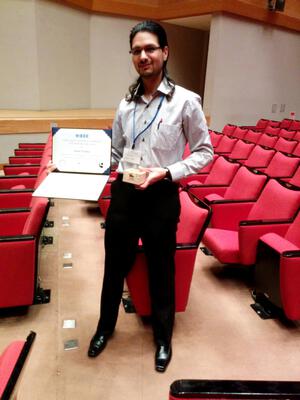Top conference award a milestone for PhD student Harith
30 Jun 2015 - 10:51:28 in Achievement
 Sushi wasn't the only thing Computer Science PhD student Harith Al-Sahaf got a taster of when he travelled to Sendai, Japan in May this year. The trip to the IEEE Congress on Evolutionary Computation (CEC) represented Harith's first overseas conference. He and a team of collaborators from New Zealand and Australia presented a prize-winning paper to an audience of top researchers and practitioners from around the globe. The conference is the largest of its type and covers diverse applications of Evolutionary Computation ranging from medical to military.
Harith, who completed his undergraduate study at the University of Baghdad in his home country of Iraq, moved to New Zealand in 2006 to pursue post-graduate study in Computer Science at Victoria University. While he has attended domestic conferences before, his team's 2015 Overall Best Paper Award, bestowed within such a prestigious global context, was an exciting milestone. The research his team presented was considered “a big jump within the field”, he says.
The award-winning paper was concerned with Computer Vision, one of Harith's main research interests. “Computer Vision is about replicating human visual systems to make machines that have the ability to 'see' things as humans do”, he explains. The project could also be described as advancing 'texture classification', where materials of the same texture type are grouped together. Analysing images to generate data from the real world is in turn is used to make decisions in real-life applications.
Such real-life applications of this ground-breaking research include roadside vegetation classification for assessing fire risk, and even facial recognition technology. “But one of the most important applications is within the medical field for cancer detection”, explains Harith. “Using this technology, we can detect cancer based on the texture of the tissues which are quite different from normal tissues.”
So where to now for the enterprising Harith? He is busy with his PhD research, extending the original image classification method to handle the rotation and scaling of the textures. “It's a complex problem”, he says. Harith is also keen to attend more international conferences where he enjoys making connections, sharing information and organising collaboration on future projects.
Watch this space – we're sure to hear more from Harith soon.
Sushi wasn't the only thing Computer Science PhD student Harith Al-Sahaf got a taster of when he travelled to Sendai, Japan in May this year. The trip to the IEEE Congress on Evolutionary Computation (CEC) represented Harith's first overseas conference. He and a team of collaborators from New Zealand and Australia presented a prize-winning paper to an audience of top researchers and practitioners from around the globe. The conference is the largest of its type and covers diverse applications of Evolutionary Computation ranging from medical to military.
Harith, who completed his undergraduate study at the University of Baghdad in his home country of Iraq, moved to New Zealand in 2006 to pursue post-graduate study in Computer Science at Victoria University. While he has attended domestic conferences before, his team's 2015 Overall Best Paper Award, bestowed within such a prestigious global context, was an exciting milestone. The research his team presented was considered “a big jump within the field”, he says.
The award-winning paper was concerned with Computer Vision, one of Harith's main research interests. “Computer Vision is about replicating human visual systems to make machines that have the ability to 'see' things as humans do”, he explains. The project could also be described as advancing 'texture classification', where materials of the same texture type are grouped together. Analysing images to generate data from the real world is in turn is used to make decisions in real-life applications.
Such real-life applications of this ground-breaking research include roadside vegetation classification for assessing fire risk, and even facial recognition technology. “But one of the most important applications is within the medical field for cancer detection”, explains Harith. “Using this technology, we can detect cancer based on the texture of the tissues which are quite different from normal tissues.”
So where to now for the enterprising Harith? He is busy with his PhD research, extending the original image classification method to handle the rotation and scaling of the textures. “It's a complex problem”, he says. Harith is also keen to attend more international conferences where he enjoys making connections, sharing information and organising collaboration on future projects.
Watch this space – we're sure to hear more from Harith soon.
